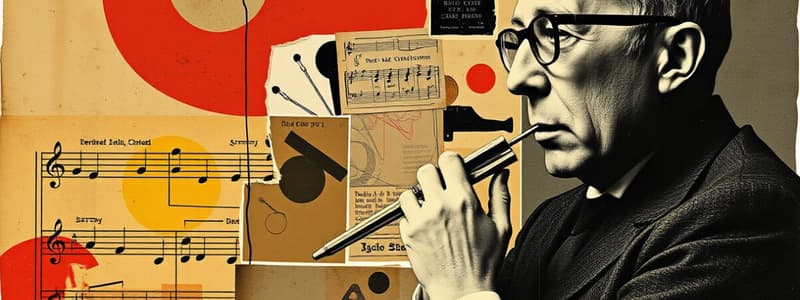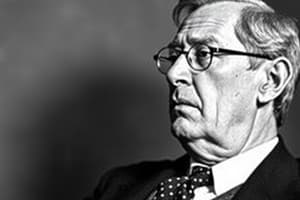Podcast
Questions and Answers
Who composed 'The Rite of Spring'?
Who composed 'The Rite of Spring'?
- Benjamin Britten
- Aaron Copland
- Igor Stravinsky (correct)
- Arnold Schoenberg
What musical system did Arnold Schoenberg pioneer?
What musical system did Arnold Schoenberg pioneer?
Dodecaphony or the twelve-tone system.
Which opera is Benjamin Britten most notably known for reviving in the U.K.?
Which opera is Benjamin Britten most notably known for reviving in the U.K.?
Peter Grimes.
What is the title of the ballet that includes the Shaker hymn 'Simple Gifts'?
What is the title of the ballet that includes the Shaker hymn 'Simple Gifts'?
What notable work is Sergei Prokofiev known for composing?
What notable work is Sergei Prokofiev known for composing?
Dmitri Shostakovich's works were not well received by the Soviet regime.
Dmitri Shostakovich's works were not well received by the Soviet regime.
What significant influence did Bela Bartók have in his music?
What significant influence did Bela Bartók have in his music?
Who was Aaron Copland's significant teacher in Paris?
Who was Aaron Copland's significant teacher in Paris?
Flashcards are hidden until you start studying
Study Notes
Igor Stravinsky
- Composer of "The Rite of Spring," noted for its incorporation of Russian folk melodies and innovative techniques like percussive dissonance and ostinato.
- Known for neoclassicism, blending elements from past music to reshape classical composition.
- Collaborated with Sergei Diaghilev's Ballet Russes, with "Parade" marking his first commissioned ballet.
Arnold Schoenberg
- Pioneered dodecaphony or the twelve-tone system, ensuring equal treatment of all chromatic scale parts.
- Early works, like "Transfigured Night," were influenced by Wagner and Strauss, shifting to expressionism with "Pierrot lunaire."
- Fled to Los Angeles in 1933 from Nazi persecution; completed works like "A Survivor from Warsaw" and unfinished opera "Moses und Aron."
Benjamin Britten
- Revitalized opera in the U.K. with "Peter Grimes," a tale of a fisherman and his apprentices.
- Gained recognition with "Variations on a Theme of Frank Bridge" and created incidental music for W.H. Auden.
- Co-founded Aldeburgh Festival of Music; notable operas include "Billy Budd," "The Turn of the Screw," and "Death in Venice."
- Composed significant non-operatic works, including "The Young Person's Guide to the Orchestra" and "War Requiem."
Aaron Copland
- First American student of Nadia Boulanger; transformed from modernism to simpler themes reflective of the American West.
- Notable ballets include "Billy the Kid," "Rodeo," and "Appalachian Spring," which features the hymn "Simple Gifts."
- Composed "Fanfare for the Common Man" within his Third Symphony and created "Lincoln Portrait," combining music with speeches of Abraham Lincoln.
- Authored educational texts on music, starting with "What to Listen For in Music."
Sergei Prokofiev
- Noteworthy for seven symphonies, with "Classical Symphony" (1917) being the most recognized.
- Premiered "The Love for Three Oranges" in Chicago; composed for Diaghilev and Ballets Russes while in Paris.
- Returned to the USSR in 1936; created "Peter and the Wolf" and scored "Alexander Nevsky."
- Faced criticism from Stalin, leading to required tributes; Prokofiev and Stalin both died on March 5, 1953.
Dmitri Shostakovich
- His music reflects the tumult of the Soviet regime and personal survival amidst oppression.
- Early operas like "The Nose" and "Lady Macbeth of the Mtsensk District" garnered praise before facing Stalin's harsh critique in Pravda.
- Wrote conciliatory works, including the Fifth and Seventh Symphonies, to appease the regime.
- "Thirteenth Symphony," based on Yevtushenko's poem "Babi Yar," denounces anti-Semitism in Nazi Germany and the USSR.
Bela Bartok
- Inspired to collect Hungarian folk songs, greatly influencing his compositions.
- Significant works include the opera "Duke Bluebeard's Castle" and ballets "The Wooden Prince" and "The Miraculous Mandarin."
- Renowned as a virtuoso pianist, he faced financial difficulties after relocating to the U.S. from Nazi-occupied Hungary in 1940.
- Best known for six string quartets, "Mikrokosmos," and "Music for Strings, Percussion, and Celesta."
Studying That Suits You
Use AI to generate personalized quizzes and flashcards to suit your learning preferences.




